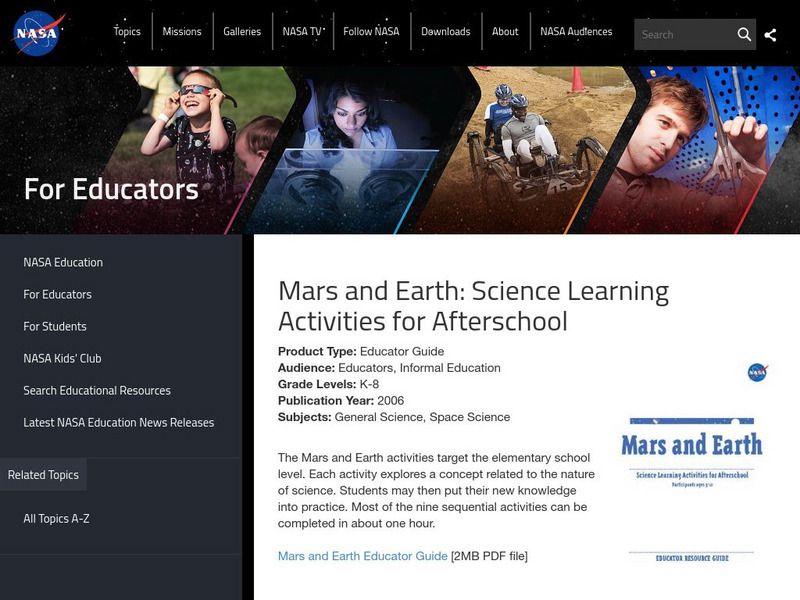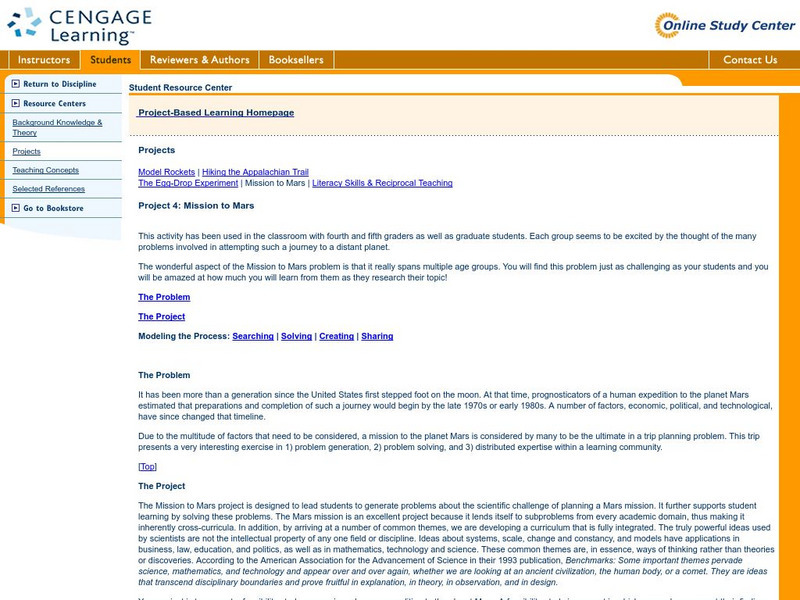Hi, what do you want to do?
Curated OER
The Excursion
Young scholars throw dice and make their way around a board, answering questions, performing tasks and finding out about the environment as they go.
Curated OER
Researching Researchers
Seventh graders use accessible technology to explore active research projects currently taking place, choose a current research project to study and create a presentation using the information that they have gathered.
Curated OER
Rubber Gardens
Students recycle discarded automobile tires and create gardening sites for limited space areas.
Curated OER
Seeing Sound and Sonar
Students grasp how underwater animals can "see" using sound waves. They practice making inferences, and build a conceptual understanding of sonar radar.
Curated OER
Green is Beautiful
Students explore the need to care for the environment and the ways in which their actions can impact their surroundings. They play a board game to illustrate the need to protect the environment.
Curated OER
Just How Big is this Place?
Students are introduced to the the formula for calculating travel time. They listen to different scenarios relating to long distance travel into space and calculate travel time using the formula.
Curated OER
Geology of Connecticut
Learners examine the geology of Connecticut, including plate tectonics, glaciation, and fossil formation.
After reviewing past lessons, they write essays about what life may have been like in the Mesozoic Period. Following a field...
Curated OER
DRY UP BABY ! ANHYDROBIOSIS (freeze drying)
In this lab, pupils explore how organisms are able to survive the extreme environmental conditions found in the Polar regions. Students observe and draw active living rotifers and Tardigrades, design and perform experiments to collect...
Curated OER
Mars Reconnaissance Orbiter Fact Sheet
In this space worksheet, students will read facts about Mars and the Mars Reconnaissance Orbiter. Students will also find 24 space related words in a word search.
Curated OER
Phase to Phase with the Moon
Fourth graders study the Moon phases. The instructional activity includes hands-on activities as well as web-based activities. They use models of the Moon and a lamp to study each of the phases of the Moon, and test their knowlege of the...
Curated OER
Sweet Candy Comets
Fourth graders use candy to make a comet. In this lesson, 4th graders examine the role comets have played throughout history, students watch NASA videos about comets and complete the lesson by making an edible model of a comet. This...
Curated OER
Penguins: Sensitive Indicators
Students examine how penguins are affected by climate change. In this climate change lesson students research the impact of climate change then create a poster to call awareness to it.
Curated OER
A Recipe for Air
Students create a pie graph using M&Ms to demonstrate the composition of air. They label each section of the graph, and list the fractions from largest to smallest.
Curated OER
Determining the Age of Fossils
Students examine the concept of radioactive dating. In this radioactive dating lesson plan, students investigate how to determine the ages of fossils and rocks as they learn about half-life radioactive decay.
Curated OER
Extensions - Astronomy Review Unit
Middle schoolers participate in a review unit in Astronomy using the Layered Curriculum. This allows them to take charge of the type of assessment that is given. The method also allows better differentiation of instruction to occur.
Curated OER
Will It Rain Today or Tomorrow?
Pupils examine how to forecast weather. They examine the different types of weather and learn the correct vocabulary.
Science Education Resource Center at Carleton College
Serc: Know Your Neighbors: Researching the Planets
Students will study planets and moons in our solar system by working online and other resources. This lesson has students working together to generate a spreadsheet of data found. Students will use this information to describe why Earth...
NASA
Nasa: Mars and Earth: Science Learning Activities for Afterschool
This set of activities teaches students about the big picture of science using Mars as an example: how to collect data, use evidence, and look at models.
PBS
Pbs News Hour Extra: Lesson Plan: Planets in Proportion
Students learn about the distance and relative size of the rest of the planets compared to the Earth and Sun. The lesson plan includes an assessment and extension activities.
Cengage Learning
Mission to Mars: Project Based Learning
Students will plan a human expedition to the planet Mars. Through this project-based activity, they can choose to learn about the surface of Mars, the trip route, the analogical features between Mars and Earth, nutrition and exercise, or...
























